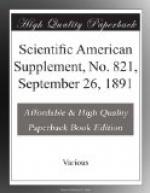The results claimed by Oppenheim, Debove, et al. were immediately challenged—and it is now generally admitted, not without some justice—by Germain See. It seems certain, to say the least, that water taken during the repast does tend to augment the quantity and facilitate the elimination of urine. Abundance of beverage, moreover, presents other advantages, in that it facilitates digestion by reason of its diluent action, a fact well worth bearing in mind when treating the obese who are possessed of gouty diathesis, and whose kidneys are accordingly encumbered with uric and oxalic acids. The foregoing presents the ground upon which Germain See permits an abundance of beverage; but he also expresses strong reservation as regards beer and alcohol, either of which (more especially the former) tends to the production of adipose. In his opinion, the only beverage of the alcoholic class that is at all permissible, and then only for cases suffering from fatty heart, is a little liqueur or diluted wine. Coffee and tea he commends highly, and recommends the ingestion of large quantities at high temperature, both during the repasts and their intervals. Coffee in large doses is undoubtedly a means of de-nutrition, and so, too, in no less extent, is tea; both act vigorously owing to the contained alkaloids, though, to be sure, they sometimes, at first, tend to insomnia and palpitation, to which no attention need be paid, however. The treatment outlined by See is:
1. A physiological regimen comprising four to five ounces of nitrogenous principles as derived from eight to ten ounces animal muscle and albuminates; three to six ounces of fat; eight to ten ounces of hydrocarbons as yielded by ten to twelve ounces of sugar or starch food.
These proportions to be modified in such manner that the musculo-albuminates shall not sensibly exceed the normal ratio, for meat in excess itself furnishes fat during transformation. The fatty substances of easy digestion may, without inconvenience, be utilized in doses of two to three ounces. The hydrocarbons should be reduced to a minimum. As for the herbaceous elements, they contain nothing nutritive.
2. Beverage, far from being suppressed, should be augmented, in order to facilitate stomachal digestion and promote general nutrition, though alcoholic liquids must be inhibited; likewise mineral waters, except, perhaps, for occasional use. Both should be replaced by infusions of coffee or tea, taken as hot as can be drank.
Henrich Kisch insists that any method which promises rapid and marked decrease of adipose must, per se, be objectionable, even if not positively injurious, since it tends to provoke general troubles of nutrition. He suggests that first the fats and hydrocarbons be reduced as little as possible; that a moderate mixed regimen is required, containing a preponderance of albumen, small quantities of hydrocarbons and gelatinous matters, with but very little fat. Certain fatty




